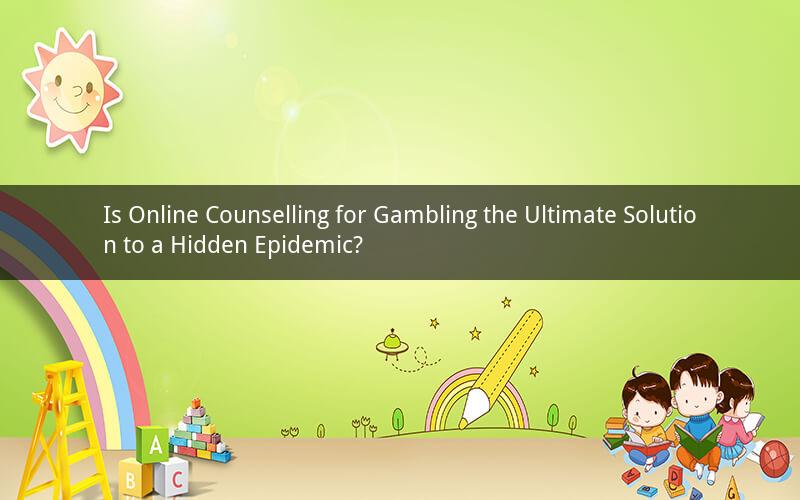
Table of Contents
1. The Hidden Epidemic: Understanding the Scope of Gambling Addiction
2. The Rise of Online Counselling: A Modern Panacea?
3. The Mechanics of Online Counselling for Gambling
- The Role of Technology in Facilitating Access
- The Comfort of Confidentiality and Accessibility
4. The Therapeutic Approach: Comparing Online and Traditional Counselling
- The Flexibility of Online Sessions
- The Personal Touch in Traditional Settings
5. Case Studies: Real-Life Stories of Recovery
6. The Psychological Impact: Unveiling the Depths of Addiction
7. The Economic and Social Consequences of Gambling Addiction
8. The Future of Online Counselling for Gambling: Challenges and Opportunities
9. Conclusion
---
1. The Hidden Epidemic: Understanding the Scope of Gambling Addiction
Gambling addiction, often shrouded in secrecy and stigma, has become a silent epidemic affecting millions worldwide. Unlike other forms of addiction, the consequences of gambling can be both immediate and long-term, impacting not only the individual but also their families and communities. The allure of online gambling has only exacerbated this issue, making it easier than ever to fall into the depths of compulsive betting.
2. The Rise of Online Counselling: A Modern Panacea?
Amidst the chaos of addiction, online counselling for gambling has emerged as a beacon of hope. With the advent of technology, individuals struggling with gambling addiction can now seek help from the comfort of their own homes. But is this modern approach the ultimate solution to a complex problem?
3. The Mechanics of Online Counselling for Gambling
The Role of Technology in Facilitating Access
Technology has revolutionized the way we access information and services. Online counselling platforms offer a seamless, user-friendly interface that allows individuals to connect with qualified professionals at any time. This accessibility is particularly beneficial for those living in remote areas or those who may feel embarrassed to seek help in person.
The Comfort of Confidentiality and Accessibility
One of the most compelling advantages of online counselling is the sense of confidentiality it provides. Individuals can share their struggles without the fear of being judged or outed. This sense of security is crucial for those who may have tried and failed to seek help through traditional means.
4. The Therapeutic Approach: Comparing Online and Traditional Counselling
The Flexibility of Online Sessions
Online sessions offer flexibility that traditional face-to-face counselling cannot match. Clients can schedule sessions around their busy lives, ensuring that they are more likely to stick with the treatment plan. This flexibility is particularly important for those who may have limited time or resources to commit to regular therapy.
The Personal Touch in Traditional Settings
While online counselling provides convenience, traditional settings offer a personal touch that can be invaluable. The physical presence of a therapist can create a stronger bond and help individuals feel more supported. However, this personal connection comes with the added challenge of overcoming social stigma and transportation barriers.
5. Case Studies: Real-Life Stories of Recovery
The power of online counselling for gambling addiction can be seen through the stories of individuals who have overcome their addictions. For example, John, a 35-year-old engineer, struggled with online poker for years. After enrolling in an online counselling program, he was able to confront his addiction and develop healthier coping mechanisms. "The online sessions gave me the space to talk about my struggles without judgment," John said. "It was a game-changer."
6. The Psychological Impact: Unveiling the Depths of Addiction
Gambling addiction is a complex psychological condition that can have devastating consequences. It often leads to feelings of guilt, shame, and despair. Online counselling provides a safe space for individuals to explore these emotions and develop strategies to manage them.
7. The Economic and Social Consequences of Gambling Addiction
The economic and social impact of gambling addiction is profound. It can lead to financial ruin, strained relationships, and even homelessness. Online counselling offers a lifeline to those who may feel trapped in a cycle of despair.
8. The Future of Online Counselling for Gambling: Challenges and Opportunities
While online counselling for gambling addiction has made significant strides, it also faces challenges. One of the biggest challenges is ensuring the quality and effectiveness of online therapy. Additionally, the stigma surrounding addiction remains a barrier to seeking help.
9. Conclusion
Online counselling for gambling addiction offers a promising solution to a hidden epidemic. With its flexibility, confidentiality, and accessibility, it has the potential to transform the lives of millions. However, it is crucial to address the challenges and continue to improve the quality of online therapy to ensure its long-term success.
---
Questions and Answers
Q1: What are the main advantages of online counselling for gambling addiction?
A1: The main advantages include accessibility, confidentiality, flexibility, and the ability to seek help from the comfort of one's own home.
Q2: How does online counselling compare to traditional face-to-face therapy?
A2: Online counselling offers greater flexibility and accessibility, while traditional therapy provides a personal touch and a stronger therapeutic bond.
Q3: Can online counselling be as effective as traditional therapy for gambling addiction?
A3: Yes, online counselling can be just as effective as traditional therapy, especially when combined with other support systems.
Q4: What are the challenges of online counselling for gambling addiction?
A4: The main challenges include ensuring the quality of therapy, addressing social stigma, and providing ongoing support to clients.
Q5: How can individuals find reputable online counselling services for gambling addiction?
A5: Individuals can find reputable online counselling services by researching the credentials of therapists, reading reviews, and seeking recommendations from trusted sources.